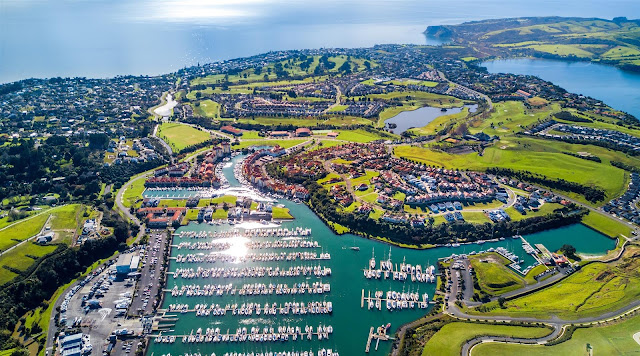'Tenants on our own land'
'Tenants on our own land': New Zealand bans sale of homes to foreign buyers
The Harbour & Suburbs of Auckland
Law aims to boost housing affordability after prices in some areas rise by over 75%
The New Zealand government has banned the sale of existing homes to foreign buyers, saying New Zealanders were sick of being “tenants in our own land”.
Associate minister of finance David Parker said the ban would mean housing would become more affordable for locals, and supply would increase.
“We think the market for New Zealand homes and farms should be set by New Zealand buyers, not overseas buyers,” said Parker in an interview with the Guardian.
“That is to benefit New Zealanders who have their shoulder to the wheel of the New Zealand economy, pay tax here, have families here. We don’t think they should be outbid by wealthier people from overseas.”
In a speech to parliament on Wednesday he said: “We should not be tenants in our own land.”
Only a quarter of adults in New Zealand own their own home, compared with half in 1991, and in the last five years homeless figures have increased, with some New Zealanders forced to live in cars, garages and under bridges.
A report by the Economist in 2017 found New Zealand had the most unaffordable house prices in the world, with prices in Auckland climbing 75% in the last four years, although the market has cooled in recent months.
The ban applies to all nationalities, except buyers from Singapore and Australia.
Parker said in the last economic quarter 10% of homes in the popular Queenstown Lakes District (where PayPal co-founder Peter Thiel owns a multi-million dollar home) and 20% of homes in Auckland central were bought by foreigners.
A place to get away from it all
New Zealand has become a destination for Chinese, Australian and Asian buyers and has gained a reputation as a bolthole for the world’s wealthy, who view it as a safe haven from a potential nuclear conflict, the rise of terrorism and civil unrest, or simply as a place to get away from it all.
Land sales to foreign buyers boomed under the previous centre-right National government, with 465,863 hectares (1.16m acres) bought in 2016, an almost sixfold increase on the year before. That is the equivalent to 3.2% of farmland in a country of 4.7 million people.
According to the latest figures from statistics New Zealand, 3.3% of homes sold in the last quarter were to foreigners, with the bulk of the buyers Chinese, followed by Australians. Tax residents of the UK, US and Hong Kong were also among the biggest buyers of property.
Under the new legislation foreigners would still be able to purchase apartments in large-scale block developments off the plans, in an attempt to boost the overall housing stock for New Zealanders.
Parker says in places like the Queenstown Lakes, where US multi-millionaires Peter Thiel and Matt Lauer have purchased properties, the ban will induce construction companies to build more smaller, family-friendly homes.
However, under the new law Thiel would still be able to buy property in New Zealand. Thiel became a New Zealand citizen despite having spent only eight days in the country after he gained approval under the former government.
“We were in opposition at the time Peter Thiel was granted citizenship,” said Parker. “We can’t undo what has already been done. But that won’t happen in the future.”
The ban on foreign ownership is at the heart of the government’s plan to tackle the housing crisis, as well as its commitment to build 100,000 affordable new homes in ten years, and increase social housing stock by 6400 homes in four years.
Economist Shamubeel Eaqub said although the government’s efforts were “better than nothing” they lacked ambition.
The foreign buyer ban would make it “cumbersome” for foreigners to invest in building new housing stock in New Zealand, and that could dissuade them from trying, meaning less homes and apartments could potentially be built, Eaqub said.
“The kind of property that billionaires buy is never going to be used for public or social housing. Locking out multi-million dollar buyers doesn’t mean developers will start building smaller, basic houses. There is never a market for poor people, it is not profitable to build houses for poor people. That’s the challenge.”
The opposition National party’s finance spokeswoman Amy Adams said the foreign buyer’s ban was “xenophobic”, and said it had already sent a chill through the international business investment community, with business confidence falling to its lowest level since 2008.
“The government has put this up as some sort of panacea to the issue of housing affordability in New Zealand, but the evidence is that it is likely to make the problem far worse,” she said.




Comments